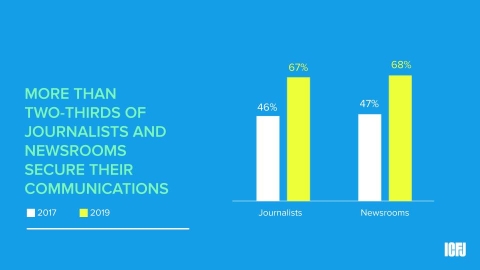
Journalists around the world are increasingly turning to digital technology to help address daunting challenges such as the spread of misinformation and growing attacks on reporters, according to the International Center for Journalists’ 2019 survey of the State of Technology in Global Newsrooms.
This unparalleled survey, conducted in 14 languages, is based on responses from more than 4,100 newsroom managers and journalists from 149 countries. The study updates and expands upon ICFJ’s pioneering 2017 report, which revealed that journalists were struggling at that time to keep pace with the digital revolution.
“There is a major shift afoot as news outlets come under attack digitally and physically,” said ICFJ President Joyce Barnathan. The findings show that newsrooms are embracing a range of digital tools to secure their communications and ensure the veracity of their information:
- More than two-thirds of journalists and newsrooms secure their communications while less than 50% did so two years ago. The percentage of North American newsrooms securing communications has doubled to 82% with Europe the leader at 92%.
- More than 50% of journalists surveyed say they regularly use digital tools to fact-check information.
- While only 11% used any kind of social media verification tools in 2017 that number has more than doubled this year. Currently, one-quarter of journalists say they use the tools at least weekly, and more than one-third of news managers report the same.
- One-third of news organizations have dedicated fact-checkers on staff. Additionally, 44% of newsrooms and 37% of journalists have engaged in more fact-checking activities over the past year.
View the full report, and see highlights from the survey.
This study is part of ICFJ’s expanding focus on practical journalism research. ICFJ is uniquely positioned to gain insights on key trends in the industry at a time of rampant disinformation and crackdowns against the media. To lead that effort, ICFJ has hired internationally renowned journalist and media researcher Dr. Julie Posetti for the newly created position of Global Director of Research.
Posetti comes to ICFJ from the Reuters Institute for the Study of Journalism at the University of Oxford, where she led the Journalism Innovation Project. She previously served as head of Digital Editorial Capability at Fairfax Media and as a news editor, documentary reporter and national political correspondent with the Australian Broadcasting Corporation. Posetti will remain UK-based and keep her academic affiliations with the Reuters Institute and the Centre for Freedom of the Media at the University of Sheffield.
ICFJ’s 2019 survey highlights other important trends:
- Digital-only newsroom growth is flat or down everywhere except in East/Southeast Asia, suggesting that fewer online startups are launching. The biggest decline in digital-only news outlets has been in North America and Eurasia/former USSR.
- Technical experts are still few and far between in newsrooms. Only 4% of newsroom staff are tech professionals, up from 2% in 2017.
- Newsrooms in North America (39%) and sub-Saharan Africa (27%) are the least worried about building audience trust.
- Advertising is not the largest revenue source for a majority (54%) of newsrooms, as they diversify their funding sources.
- Women are making significant headway in the newsroom. They hold half or more of newsroom management positions in four of the eight regions we surveyed.
Georgetown University’s Communication, Culture and Technology program helped to administer the survey, which was supported by Google News Initiative and Fusion. Results were analyzed across eight regions: Eurasia/former USSR, Europe, Latin America/Caribbean, Middle East/North Africa, North America, sub-Saharan Africa, South Asia, and East/Southeast Asia.
Media Contact Zainab Imam, 202-349-7614, zimam@icfj.org
About ICFJ ICFJ works at the nexus of journalism and technology, building the expertise and storytelling skills of reporters worldwide. Through our work, journalists are enhancing news coverage and connecting more deeply with their audiences. As a result, we are increasing the flows of reliable, trustworthy news - a cornerstone of healthy democracies. We believe that better journalism leads to better lives. Follow us on Twitter at @ICFJ.